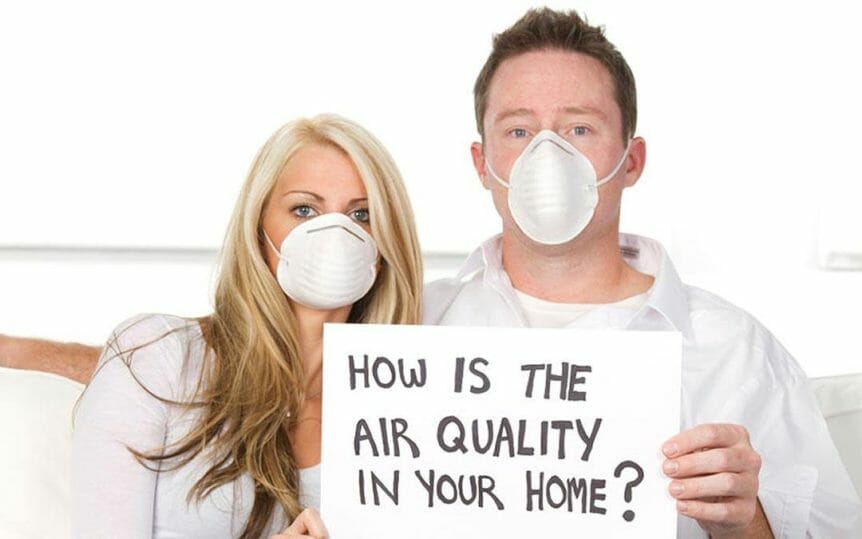
Winter Humidity Will Cause Major Indoor Air Quality Problems
Humidity is a term that we Houstonians directly relate to summertime. And if you’re not from Houston, all it takes is spending one day of summer in our great city to know what we are talking about. But the thing with excess humidity is that it doesn’t just come around during the summer months, and winter humidity can be just as bad. Not only does it make your living conditions uncomfortable, but it can also cause major health problems.
“Humidity is a measure of the amount of water vapor that is in the air. It is basically the difference between the temperature of the outside air and the air that is inside the home,” said John Moore Services HVAC Coach Lewis Yancey. “The greater the temperature difference is between the outside and inside, the greater amount of humidity a house will have if it isn’t equipped with the right systems. And having too much or too little humidity inside the home will either make the home sweat, or extremely dry. To get optimal living conditions, having the correct percentage of humidity is very important.”
What’s wrong with high humidity?
When the humidity is high outdoors and you go for a walk, what happens? You immediately get hot, sweaty, and sticky. And when you have too much humidity inside your home, that same thing happens to all parts of your house. When humidity starts to become a problem, you will first notice condensation on your windows, walls, and other surfaces. But the thing with humidity is that it doesn’t just get on the surface of things, it creeps down inside them. In fact, it can force its way through wood, plaster, brick, and cement, which are most of the components of your house.
As excess moisture sits inside your home, biological growth begins to develop in places like your walls and air ducts, and causes major indoor air quality problems. This growth is then distributed throughout your home through your air vents and can cause respiratory problems for your whole family.
“Air ducts are not designed to remove moisture, so if you have a high humidity problem in your home one of the first things that will happen is biological growth issues in your air vents,” said Yancey. “The longer the growth stays inside your home the more problems you will experience. They can range from breathing issues, to coughs, to headaches and asthma.”
What’s wrong with low humidity?
When the temperatures drop in the peak of winter, humidity in the house has a tendency to drop as well and can fall to as low as 10 percent. The recommended amount of humidity for a typical household is 45-55 percent, so that is a major difference. When the humidity level gets this low, everything in your house will dry out, including the people in it. Furniture will start to dry out, wood floors will start to warp, but the biggest problems are directed towards people.
“Your whole body will start to dry out. You will experience dry skin and hair, chapped lips, scratchy throats, and dried out sinus cavities,” said Yancey. And your body moisture will evaporate so quickly that you feel chilled even at higher thermostat settings. When this happens, you will be prone to bad colds and respiratory problems.”
How can I correct the humidity levels in my home?
The easiest and most efficient way to correct indoor humidity problems is to purchase a dehumidifier for your home. It circulates the air and balances the difference between the indoor and outdoor temperatures. It also removes excess humidity out of the air to eliminate moisture and prevent any biological growth from developing throughout your home.
“Dehumidifiers are great and are easy to use because they attach directly to the AC unit and can be used in both the winter and the summer,” said Yancey. “They are designed to keep your home humidity level at 44-55 percent, which is the optimal range for indoor humidity. To determine if a house is in need of one, I first figure out what the dew point is in the home, and depending on that reading I am able to see if a house has a problem with humidity.”
While the dew point test is important, if your home is in need of a dehumidifier you will know it. If your air feels heavy, wet, you notice condensation on your windows and other surfaces, or you are developing any of the health issues listed above, you have a problem. And by getting your humidity level under control you are also making your HVAC system run more efficiently because it isn’t having to work as hard to make your indoor air temperature comfortable. If you think you have a problem, call the experts at John Moore Services to come fix it. Our experienced HVAC technicians can correct all issues associated with high or low humidity and can get the temperatures inside your home back to perfect condition. Give us a call today so you can breathe comfortably during the holidays!
